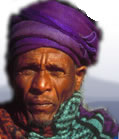THEMES IN THIS
TESTIMONY
Agriculture

Communications

Education

Food Security

History

Identity

Justice and crime

Land

Population

Resettlement

Social Institutions

Social Relationships

Spiritual Beliefs

Click on arrows
to find more
testimonies
featuring
these themes
|
|
Sex
|
male
|
|
|
Age
|
28
|
|
|
Occupation
|
farmer
|
|
|
Location
|
Meqerretcha/Denkenna (highlands)
|
|
|
Date
|
June 1997
|
|
summary
Mesay Getaye is a young man who was not able to complete his studies. He reflects thoughtfully on land use, health, drought, population growth and the development that is being undertaken, such as tree-planting and terrace-building. As the head of the parish committee, he talks about social responsibility, his role in reconciling those who have quarrelled, and punishments for offenders.
detailed breakdown
|
You will need a password from Panos to view the full
transcript of the interview. To apply for a password, click here.
Once you have a password, click here to go to the beginning
of the transcript. You can also click on any section of the
breakdown of content below and go straight to the
corresponding part of the transcript.
|
| Section 1 |
Changes in land production, population growth, soil erosion and food shortages. Local markets – foodstuffs brought in from other areas.
|
| Section 2 |
Crops produced – barley and linseed. Development work being undertaken – planting trees, building terraces. Climate change – low rainfall affecting harvests. Importance of fertiliser and modern farming methods.
|
| Section 3 |
Brief description of Qire. Punishments for non-attendance at funerals. Betrothal and marriage customs. Causes of divorce: “firstly hardship and secondly disagreement between spouses”. Children and parents – children no longer interested in their lineage. Men and women – now have equal status. Highlanders and lowlanders – how economic relations worked in the past.
|
| Section 4-5 |
Care of disabled members of the community. Brief mention of differences between people in Meket and people in other areas. Different food eaten by highlanders and lowlanders. Religion – importance of respecting traditions.
Education – did not complete schooling as parents could not afford it: “I came to understand through education that it is better to teach others than to quarrel with them.” Radio as a means of self-education.
|
| Section 6-8 |
Construction of Chinese road – benefits to community. Health and sickness – more diseases now; no health centre in the village. Population increase – importance of limiting family size.
Drought and coping strategies: “Drought itself is not something new since the problem occurred every four years. However, the farmers don’t seem to realise this and hence they become vulnerable.”
Education – also teaches people importance of budgeting/managing resources: “If one consumes everything he has at one time it won’t last him even for a month let alone for a year. So one has to consume according to a plan.” |
|


